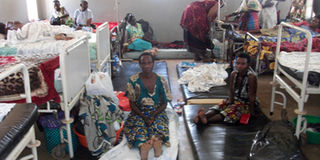Fistula leaves women leaking away in misery

Women at a fistula camp at Mbarara Regional Referral Hospital recently. The government has launched a National Obstetric Fistula Strategy to deal with the increasing cases of the ailment in the country. PHOTO BY RAJAB MUKOMBOZI.
What you need to know:
The Ministry of Health estimates that there are about 200,000 women suffering from fistula in the country. However, the ministry can only carry out surgery on 2,000 women annually due to shortage of funds, leaving the bigger majority to endure daily urine and fecal leakage some, for the rest of their lives.
Kampala
Getu Nakiyingi can hardly walk a distance of 300 metres without pausing to rest. With a plastic bag in one hand and a bottle of water in the other, she slowly makes her way along the walkway of Ward 14 at Mulago Hospital to take a rest in the compound. “It is so painful, I want to get discharged and go home,” she says.
Four days earlier, Nakiyingi had undergone a fistula operation and so she was still fitted with tubes that had connected her bladder to a plastic bag through her vagina. Fistula is a disease that results from maternal injury during child birth where a hole or abnormal opening in the birth canal results in chronic leakage of urine, feces or both.
One woman’s woes
“This smell used to be worse, I used to hate myself. I had to pad myself with a rug every single day for 50 years. Imagine that, and at times I used to even develop wounds and when the urine flows, it would burn me,” says Nakiyingi, narrating her experience of living with a condition that she hardly understood and being rejected by the community. “I hated to take tea because it meant urine coming out more often,” she says.
Nakiyingi developed fistula while giving birth to her first child 50 years ago. The child, who later passed on, had been delivered from home in Kasozi Village, Nakasongola District with the help of a neighbour.
From the time she developed fistula, Nakiyingi has had three husbands. They often get separated from her after learning that she is suffering from fistula. She has also had five children but only two are surviving. She explains that everyone has shunned her and she is currently being taken care of by her daughter.
Nakiyingi’s story is a tale that resonates with thousands of women across the country, especially in rural areas where many have become social misfits because they are suffering from fistula. Ministry of Health acting Director General for Health Services, Dr Jacinto Amandua, acknowledges that fistula has remained a hidden condition, characterised by stigma, poverty, ostracism and other psychosocial effects.
The Ministry of Health estimates that there are about 200,000 women suffering from fistula in the country.
And for every woman who dies during childbirth, 20 to 30 survive with complications, including fistula while in most cases the baby dies.
The dilemma is that of the 200,000 women suffering from the condition, the ministry can only carry out surgery on 2,000 women annually, leaving the bigger majority to endure daily urine and fecal leakage some, for the rest of their lives.
Dr Amandua explains that the cost of operations is very high yet consumables and other surgical equipment required for an operation are not readily available in hospitals. He revealed that it costs $400 (Shs1.4 million) to operate on only one person, which denies the ministry their wish to operate all patients.
“We depend on donors for support and we hope that with time the National Medical Stores can increase on what we get,” Dr Amandua said. “Fistula is a forgotten condition here and we need to raise awareness to gain support for change in terms of increased resources and sensitising the community about prevention,” he said.
Causes
Dr Amandua explains that causes of fistula in general include sexual violence and rape, infections like tuberculosis and cancer and some due to operations that go wrong. Other risk factors are teenage pregnancies, small and short women, those with stunted growth, malnutrition, harmful traditional practices and birth not attended by skilled personnel. Other contributing factors include delays in reaching hospitals, late referral and unskilled attendants.
Uganda has now launched a National Obstetric Fistula Strategy to deal with the increasing cases of fistula in the country. The strategy calls for an accelerated prevention and management of the disease.
According to Ms Janet Jackson, the country representative of the UN Population Fund (UNFPA), for fistula to be ably managed, equal attention should be given to operations for repairs and for prevention strategies to avert future cases. “UNFPA calls for three action plans: improved response from the Ministry of Health, enhance the use of Village Health Teams and members of Parliament should campaign for antenatal visits,” Ms Jackson says.
The president of the Uganda Medical Association, Dr Margaret Mungherera, said training and supervision of young health practitioners needs to be enhanced and that it is high time medical professionals extend their work to include sensitising communities about preventative diseases such as fistula.
Although capacity building has been enhanced to have 23 fistula surgeons in the county, only eight of 13 regional referral hospitals are in position to carry out these operations. Dr Amandua says they are focusing on reducing new cases and the strategy clearly lays out preventive methods which include advocacy and sensitisation of the public.




